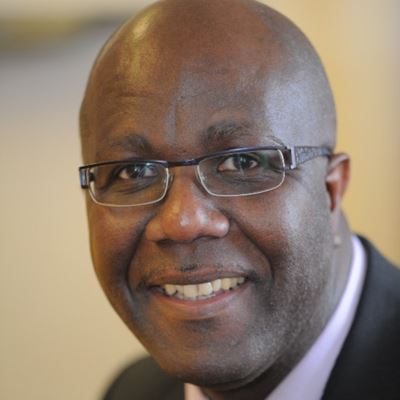For Black History Month 2021 we’re using our platform to shine the spotlight on leading Black and Minority Ethnic (BME) figures in social housing who have excelled in their fields and helped shape our sector today. In this interview, we catch up with Llewellyn Graham, Chief Executive of Nehemiah Housing Association.
Tell us a bit about your journey and career as a Black man in housing
I started my career as a social worker in Wolverhampton and later became director of a voluntary organisation called the Wolverhampton African Caribbean Development Agency who were involved in community development work, supporting organisations who wanted to respond to social issues in the community as well as encouraging business start-ups.
Tony Sealey, a prominent black Midlands entrepreneur, was a consultant in the 1980’s and was involved with the work I was doing. He became an instrumental figure in shaping my consideration of a social housing career, advising that it was a sector that offered longevity. In a nutshell, that is how I came to be interested in my now chosen career path.
During that period in the ‘80’s, I was a member of The Church of God of Prophecy (a Black-majority, Pentecostal denomination). Church leaders observed that a large number of people in church congregations were retired, becoming increasingly frail and living in inadequate housing for their needs. The leadership of the church felt they needed to do something substantial and practical to support these people – the people we now call the “Windrush generation”.
The conviction to put resources in place to care for the vulnerable older generation was the driving force behind the start of Nehemiah Housing. Around this time, the Commission For Racial Equality also published their research about discrimination and disadvantage in housing which led to the creation of a strategy by the then Housing Corporation to respond to disadvantages in social housing and, in particular, in relation to the poor housing conditions of Black people.
On account of my community development work, I was approached by Bishop Wilton Powell and the late Bishop Horatio Fearon who told me the church was being encouraged by local authorities across the West Midlands to set up a small housing association to respond to the needs of the Windrush generation. They needed somebody who could help them to set up the fledgling organisation and to get it through the registration process so that they could build a retirement scheme for older black people.
On the basis of Tony Sealey’s encouragement, the Wolverhampton Taskforce at that time was quite keen to support young black people like myself to pursue a career in social housing, and so they provided the necessary funding. The National Housing Federation had a programme in place called the PATH (“Positive Action Training in Housing”) National Training Scheme that I enrolled on whilst a work placement (for practical instruction and experience) came from Coventry Churches Housing Association (CCHA). So, all of those things came together, and I took the opportunity to get involved in housing.
That’s the essence of how I got started, being trained at CCHA in various business disciplines, but particularly for the role of leadership. There’s much more that could be said, but the rest, as they say, ‘is history’.
Incidentally, I started as the first employee of Nehemiah Housing Association in 1989 and I’m still here at the helm of the organisation over 30 years later.
What are the biggest achievements in your career in housing?
There are several. The first one was to get Nehemiah registered with the Housing Corporation and thereafter to build the Association’s first sheltered housing scheme which we named Plummer House after one of the Church elders, Rev. Everett Plummer.
It’s difficult to single out other specific achievements because the whole Nehemiah story is a success story. When we started in the mid/late 1980’s, we were told we wouldn’t ‘make it’ due to not having a previous track record of running a successful, self-sustaining social business. This is a myth we ‘busted’ and, due to the commitment of successive boards, the executive team and staff, we are here 30+ years later as a successful BAME housing association, employing over 30 people with over 1200 homes under management, housing 4000+ people across the West Midlands. We have survived and thrived.
When the topic of achievement is discussed, the focus is usually on the success of an organisation but, ultimately, it’s all about people development. Whilst the bricks and mortar and financial viability are evidence of success, to be able to start from nothing with one person (being myself) and establish a platform that has supported so many professionals through that time – who are still in housing - is one of the greatest achievements.
What impact does Nehemiah Housing Association have on the local community and residents?
Nehemiah specialises in providing high-quality accommodation and support packages for older people from Black, Asian and Minority Ethnic communities. As a housing association we are proud of all the work we do to help those in need of support, and we have a long history of supporting young people in jobs and apprenticeships. I’m especially proud of our work developing the early “ReBuild” apprenticeship programme in the 2000’s which then grew into the current Nehemiah Academy, and more recently our involvement in the government’s Kickstart Scheme.
Our aim is to continue a trend of growth through the expansion of the housing we offer and further diversification of our activities, and we remain committed to combating the affordable housing shortage in our region. We will continue to work with our residents in both providing homes and creating diverse communities in which they are proud to live.
Why is diversity important in social housing?
Diversity is important in every aspect of society since Britain is a multi-cultural and multi-faith nation. All institutions should reflect our society positively and provide opportunities for everyone to thrive and maximise their full potential. If each individual realises their productive potential, the nation benefits overall, and so diversity is absolutely critical.
Do you have any inspirational BME figures in housing?
There are many people who inspired me in those early years. The ‘non-black’ Bill Martin, Chief Executive of the CCHA, is a key figure who was very inspirational to me, was a great leader and who, at that time, was doing some wonderfully innovative things.
I have to mention Rod Cassou, my former mentor at CCHA who, alongside Bill Martin, was one of the key supports to the fledgling Nehemiah Housing Association and its board.
There were other young BAME Chief Executives in the sector who also inspired me, including Arvinder Gohil, CEO of Unity in Leeds, and Steve Douglas, CEO at Spitalfields Housing Association in London who progressed to become CEO of The Homes and Communities Agency (HCA).
Then we had consultants such as Tony Soares, who helped Nehemiah’s board in the early days, and Louis Julienne at the Federation of Black Housing Organizations (FBHO). These individuals provided a tremendous amount of inspiration in those formative years.
Why is Black History Month important to celebrate?
It’s a month where the history, contribution, and achievements of Black people are recognised and celebrated. This history has been whitewashed from the UK school curriculum over many years and, if we are truly going to be a fair and equal society, the truth about Black history, the contributions made by Black people and the reason for them being here needs to be spoken clearly, robustly and regularly.
Black History Month is a small opportunity to begin to redress that imbalance of traditional British history telling, but we don’t just need black history to be recognised for only one month of the year. We need to ensure that Black history is something that is taught in our schools. It should be part of the national curriculum and embedded in educational establishments, to be taught for years to come. It needs to be mainstreamed in our society so that we can understand the basis of our diverse country and the opportunity it provides for both personal and national growth.














